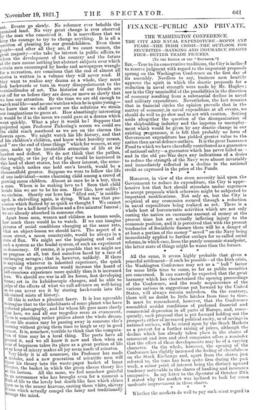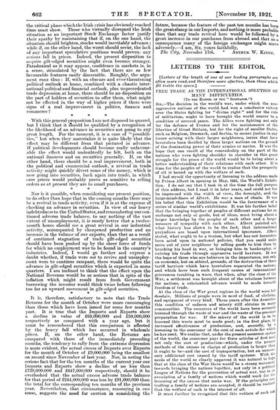FINANCE—PUBLIC AND PRIVATE,
THE WASHINGTONCONFERENCE.
THE CITY AND NAVAL EXPENDITURE—HOPES ANn FEARS—THE IRISH CRISIS—THE OUTLOOK FOR SECURITIES—BANKING AND INSURANCE SHARES FIRM—BETTER TRADE FIGURES.
[To TILE EDITOR or THE " SPECTATOlt."3 Sin,—Truc to its conservative traditions, the City is inclinel to reserve judgment with regard to the important proposals sprung on the Washington Conference on the first day of its assembly. Needless to say, business men heartily approve the spirit in which the drastic proposals for a reduction in naval strength were made by Mr. Hughes ; nor is the City unmindful of the possibilities in the direction of economy resulting from a substantial decline in naval and military expenditure. Nevertheless, the fact remains that in financial circles the opinion prevails that in the matter of economy, in naval expenditure at all events, we should do well to go slow and to act with caution. Setting aside altogether the question of the disorganization of tho shipbuilding industry and the impetus to unemploy- ment which would be given by any drastic change in our existing programme, it is felt that probably no form of Government expenditure has yielded greater value to the nation than naval defence outlays. It is the great Insurance Fund to which we have cheerfully contributed as a guarantee of national safety—a guarantee which has never failed us— and in the old pre-War days any indications of a desire to reduce the strength of the Navy were almost invariably and immediately reflected in a decline in the national credit as expressed in the price of the Funds.
Moreover, in view of the stern necessity laid upon the Government to reduce its expenditure, the City is appre- hensive lest that fact should stimulate undue eagerness to accept proposals which otherwise might be subjected to important modifications. Not only so, but the City is sceptical of any economics secured through a reduction in naval expenditure being realized as net. There is a whole host of bureaucratic activities which are not only costing the nation an enormous amount of money at the present time but are actually inflicting injury to the economic position, and it is perceived that with the present tendencies of Socialistic finance there will be a danger of at least a portion of the money " saved " on the Navy being immediately applied to further outlays for so-called social reforms, in which case, from the purely economic standpoint, the latter state of things might be worse than the former.
All the same, it seems highly probable that given a peaceful settlement—if such be possible—of the Irish crisis, the Washington Conference may act as a " bull " factor for some little time to come, so far as public securities are concerned. It can scarcely be expected that the great harmony which has characterized the opening proceedings of the Conference, and the ready acquiescence of the various nations in suggestions put forward by the United States, will always remain unbroken. On the contrary, there will no doubt be little hitches from time to time. It must be remembered, however, that the Conference assembled amidst conditions of profound financial and commercial depression in all parts of Europe, and, conse- quently, each proposal that is put forward holding out the prospects either of increased political amity, or of savings in national outlays, will be seized upon by the Stock Markets as a pretext for a further raising of prices, although the decline which has already taken place in the shares of armament and iron and steel companies offers a reminder that the effect of these developments may bo of a varying character. On the whole, however, the opening of the Conference has slightly increased the feeling of cheerfulness on the Stock Exchange and, apart from the shares just referred to, the tone has been quite firm during the past week, a minor point of interest being the distinct upward tendency noticeable in the shares of banking and insurance companies. In my letter to the Spectator of October 29th I stated why the market was inclined to look for some moderate improvement in these shares. * * Whether the markets do well to pay such scant regard to the critical phase whichthe Irish crisis has obviously reached time- must show. Those who virtually -disregard the Irish situation as an important- Stock Exchange factor justify their apathy by maintaining that if, on the one hand, the situation should brighten, stocks would inevitably advance ; while if, on the other hand, the worst should occur; the lack of any important speculative positions would prevent any serious fall in prices. Indeed, the present disposition to acquire gilt-edged securities might even become stronger. Paradoxical as it may appear, confidence in markets is, in a sense, stimulated by the fact that there are so few' favourable features easily discernible. Roughly, the argu- ment runs thus: If, with an obscure and ever-threatening political outlook at home, combined with. a chaotic inter- national political and financial outlook, plus unprecedented: trade depression at home, there should be no disposition on the part of holders of securities to offer them, what might not be effected in the way of higher prices if there were signs of a real improvement in politics, finance and commerce ?
* * - With this general proposition I am not disposed to quarrel, but I think that it should be qualified by a recognition of the likelihood of an advance in securities not going to any great length. For the moment, it is a case of `possibili- ties," but when they materialize it is quite likely that the effect may be different from that pictured in advance. If political developments should become really unfavour- able the effect would undoubtedly be felt, both on the national finances and on securities generally. If, on the other hand, there should be a real improvement, both in the political and commercial outlook, a revival in trade activity might quickly divert some of the money, which is now going into securities, back again into trade, in which case prices would probably prove as sensitive to selling orders as at present they are to small purchases.
Nor is it possible, when considering our present position, to do other than hope, that in the coming months there may he a revival in trade activity, even if it is at the expense of checking an advance in securities. In view of our heavy indebtedness to the United States, and remembering our con- tinued adverse trade balance, to say nothing' of thevast extent of unemployment, it is surely better that a twelve- month hence should see a great revival• in our industrial activity, accompanied by cheapened production and an increase in the volume of our exports, than that as a result of continued stagnation of trade gilt-edged securities should have been pushed up by the sheer force of funds for which no employment was to be found in the country's industries. Indeed, I would go further and express a doubt whether, if trade were not to revive and unemploy- ment were to continue rampant; there would- be quite the advance in gilt-edged securities which is expected in some quarters. I am inclined to think that the effect upon the National Revenue would be so serious that in spite of the inflation which might result from fresh Government borrowing the investor would think twice before following too far an upward movement in gilt-edged securities.
It is, therefore, satisfactory to note that the Trade Returns for the month of October were more encouraging than those which have been issued for some few months past. It is true that the Imports and Exports show a decline in value of £65,000,000 and £56,000,000 respectively as compared with a year ago, but it must be remembered that this comparison is affected by the heavy fall which has occurred in wholesale prices. If, on the other hand, the Returns are compared- with those of the immediately preceding months, the tendency to rally from the extreme depression is more evident, the actual excess of Imports over Exports for the month of October of 19,000,000 being the smallest on record since November of last year. Nor, in noting the serious fact that for the ten months of the current year our Imports and Exports show a decline of no less than £738,000,000 and £647,000,000 respectively, should it be overlooked that the actual excess adverse trade balance for that period of £244,000,000 was less by £91,000,000 than the total for the corresponding ten months of the previous year. Nevertheless, that circumstance, reassuring in one sense, suggests the need for caution in considering the • future, ,because-the feature of the past.ten months has been the greatalump in our Imports, and nothingis more probable than that any trade revival here would be followed by a great increase in our purchases from abroad and that as a consequence many of the foreign exchanges might move adversely.—I am, Sir, yours faithfully;.







































 Previous page
Previous page